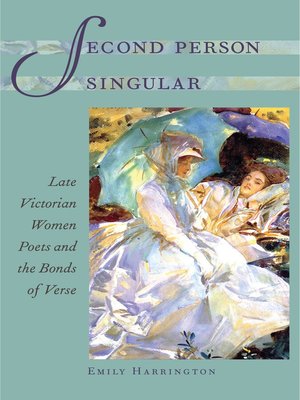Second Person Singular
ebook ∣ Late Victorian Women Poets and the Bonds of Verse · Victorian Literature and Culture
By Emily Harrington

Sign up to save your library
With an OverDrive account, you can save your favorite libraries for at-a-glance information about availability. Find out more about OverDrive accounts.
Find this title in Libby, the library reading app by OverDrive.



Search for a digital library with this title
Title found at these libraries:
| Library Name | Distance |
|---|---|
| Loading... |
Emily Harrington offers a new history of women's poetry at the turn of the century that breaks from conventional ideas of nineteenth-century lyric, which focus on individual subjectivity. She argues that women poets conceived of lyric as an intersubjective genre, one that seeks to establish relations between subjects rather than to constitute a subject in isolation.
Moving away from canonical texts that contribute to the commonly held notion that lyric poetry is an utterance made in solitude, Harrington explores the work of Christina Rossetti, Augusta Webster, A. Mary F. Robinson, Alice Meynell, and Dollie Radford to show how nineteenth-century poetic conventions shaped and were shaped by concepts of intimacy. Writing about relationships that are familial, divine, sexual, literary, and musical, these poets reconsidered the dynamics of absence and presence, and subject and object, that are at the heart of the lyric enterprise.
Harrington locates these poets' theories of intimacy not only in their formal poetic practice but also in diverse prose works such as prefaces, literary and devotional essays, and unpublished letters and diaries. By analyzing various patterns of versification and modes of address, she articulates new ways of thinking about the bonds of verse and enlarges our understanding of verse culture in the late nineteenth century.







